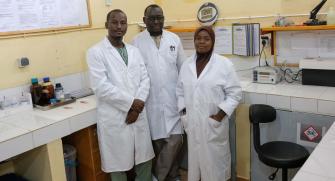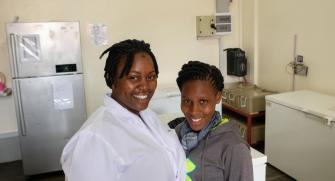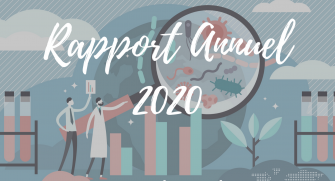Annual Report 2021
Editorial
Describing and analyzing the health situations of populations assisted by MSF medical teams to better orient programs, evaluating and comparing new care practices designed for populations living in unstable conditions or with insufficient access to care: these are the missions of Epicentre that have guided its activities in 2021.
Epidemiology to understand and prioritize
The scarcity of epidemiological data in some settings makes it difficult to prioritize policy responses and allocate appropriate solutions. Through its survey work, Epicentre seeks to fill some of these gaps.
Thus, in view of the epidemiological data collected, it seems difficult to agree that we should vaccinate 70% of the world population against Covid-19. Data from our seroprevalence studies confirm that the virus has circulated in Africa, and at a higher level than observed by official information systems. But its impact on morbidity and mortality has not reached the levels observed elsewhere in the world.
This raises the question of the place of vaccination against Covid-19 in relation to the other health risks to which populations are exposed. In Niger, for example, concerns tend to focus on malnutrition, malaria or recurrent epidemics of measles or cholera.
In a completely different field, the contribution of epidemiology has supported the MSF project on the implementation of simplified and decentralized hepatitis C care by showing its effectiveness in Cambodia. This model, which relies on the use of rapid diagnostic tests, fewer follow-up visits and laboratory tests, effective molecules, and task-shifting from physicians to nurses and pharmacists, can be integrated into public and rural health services in low-resource settings, while maintaining a high rate of patient follow-up, efficacy, and treatment safety. The results of this joint work with MSF teams have contributed to the evolution of WHO's recommendations on this subject.
Research to find appropriate solutions
Conducting quality research despite many challenges (war, famine, epidemics, natural disasters, or population displacement) remains complex: it relies on a subtle association of scientific rigor and operational capabilities. These studies are essential for demonstrating the validity of new diagnostic, preventive, or therapeutic approaches. At the same time, we cannot forget that other parameters must be taken into account for a solution to fully meet the needs of populations and the constraints of caregivers. While efficiency is central, ease of use, thermostability, transport or storage conditions and availability at an affordable cost are other key elements.
The Pneumococcal Conjugate Vaccine (PCV) project, funded by EDCTP and launched in 2021, is comparing the impact and feasibility of mass vaccination campaigns with a single or fractional dose of PCV10 in Niger.
The FujiLAM trial, supported by the ANRS and MSF, aims to demonstrate the effectiveness and acceptability of this test to diagnose tuberculosis among people living with HIV in South Africa, Uganda, Mozambique, and Kenya. This test has the advantage of being quick and easy to use, does not require sputum and can be performed without a laboratory.
To go beyond purely clinical advances, Epicentre is increasingly introducing human and social sciences into its projects. We have coupled this approach to quantitative analyses, as in the survey conducted in nursing homes in France during the 2nd wave of Covid-19, which was carried out in collaboration with a sociologist, and during a study documenting antiretroviral regimen changes in patients hospitalized in Kenya and DRC. The launch of a study on the effect of psycho-social stimulation on nutritional recovery in Niger marks a new step in this approach and is in line with the strategic priorities set in 2020.
Emmanuel Baron, Director of Epicentre
Read the annual report in PDF
Epicentre in figures
A hundred projects in 2021
Where?
2/3 in Africa, and otherwise mainly in Asia and Europe.
About what?
Among the most studied pathologies, in decreasing order were Covid-19, HIV, Ebola, tuberculosis, cholera and measles.
For whom?
These projects include both the general population and targeted groups, such as children, adolescents, or pregnant women.
- 373 people Including 59% scientific staff and 41% support staff
- 42 nationalities
69 publications in peer-reviewed journals
- 36% of publications with 1st or last author Epicentre
- 84% scientific articles and 16% of opinion papers/comments
- 22% of articles with an Impact factor greater than 10 (4/5 of which have a first or last Epicentre author)
€17.4 million in resources that enable Epicentre to carry out projects for MSF, including €11.1 million in funds collected by MSF from the public and €6.3 million from external funders.
Selected key studies in 2021
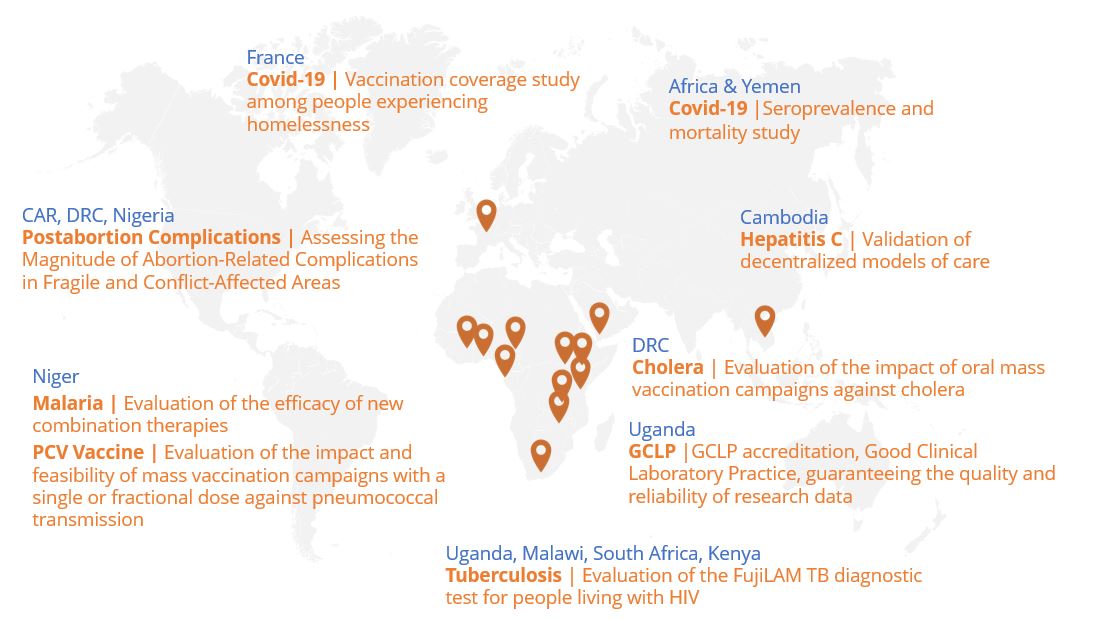
Provide cross-cutting responses
In 2021, Epicentre continued its epidemiological activities, including investigating epidemics, implementing, and evaluating surveillance systems and conducting prevalence surveys. Data from these epidemiological activities are used to assess the situation, to assist in decision-making, to evaluate program effectiveness, and to generate hypotheses for future research. Through studies conducted in the population and in health care facilities, Epicentre provides feasible, concrete, and appropriate responses for better preventive, diagnostic and therapeutic medical care for the most vulnerable populations.
Nutrition: more than ever a priority
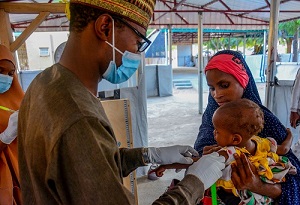 In Nigeria and Madagascar, surveys investigating malnutrition in the communities where MSF works are ongoing, and help to define the scale of the crisis. These studies identify shortcomings of certain management methods and possible avenues for improvement in order to guarantee a more comprehensive response to emergency situations. For example, in Nigeria, studies have been conducted on simplified models for the management of severe acute malnutrition in children. Despite improvements, coverage of malnutrition treatment programs remains low. Barriers include the remoteness of outpatient facilities and the impact this has on health care workers. A clinical trial conducted in Nigeria by Epicentre with MSF found that while weekly follow-up of children in care is preferable, monthly follow-up can be considered in settings where more frequent follow-up is complicated or impossible.
In Nigeria and Madagascar, surveys investigating malnutrition in the communities where MSF works are ongoing, and help to define the scale of the crisis. These studies identify shortcomings of certain management methods and possible avenues for improvement in order to guarantee a more comprehensive response to emergency situations. For example, in Nigeria, studies have been conducted on simplified models for the management of severe acute malnutrition in children. Despite improvements, coverage of malnutrition treatment programs remains low. Barriers include the remoteness of outpatient facilities and the impact this has on health care workers. A clinical trial conducted in Nigeria by Epicentre with MSF found that while weekly follow-up of children in care is preferable, monthly follow-up can be considered in settings where more frequent follow-up is complicated or impossible.
Moreover, children suffering from severe acute malnutrition are at increased risk of mortality from tuberculosis. Diagnosis of TB is particularly difficult in this population. A study carried out in children under 5 years of age hospitalized for severe acute malnutrition at the MSF-supported malnutrition treatment center in Madaoua, Niger, highlighted the encouraging potential of the LAM test, which provides a result in 20 minutes from easily collected urine samples.
Cholera: stemming epidemics
Several ongoing projects focus on cholera. On one hand, there is consensus that a rapid response to new cases increases the chances of curbing cholera’s spread. But on the other hand, there is not broad agreement on which elements should be a part of the response - antibiotics, oral vaccination, water treatment – nor how widely the response should be implemented around cases. The CATI (Case-Area Targeted Intervention) project, developed in 2021 and begun in the DRC in 2022, aims to evaluate the impact of different response strategies on transmission.
Also in epidemic response, Epicentre has laid the groundwork for a trial in Guinea to assess the feasibility of increasing the interval between two doses of oral cholera vaccine from the current 14 days. Since epidemics most often occur in contexts of insecurity or natural disasters, this short timeframe for giving the second dose can be challenging.
Together with MSF teams in DRC, Epicentre is coordinating a large Wellcome Trust-funded study to evaluate the impact of a preventive oral vaccination campaign in areas at risk of cholera, with the support of the DRC Ministry of Health and the National Program for the Elimination of Cholera and the Control of Other Diarrheal Diseases. The objective is to monitor the incidence of cholera after vaccination for at least two years, and to better understand the impact of the vaccine on the level and characteristics of disease transmission.
Covid-19: better understanding for action and reaction
Between September 2020 and November 2021, Epicentre conducted several seroprevalence and retrospective mortality surveys among diverse populations in Cameroon, Côte d'Ivoire, DRC, Yemen, Mali, Sudan, Kenya, and Niger. Due to poor access to diagnostic tests, there were concerns that the epidemic was silent but resulted in unreported deaths. All surveys showed that the proportion of people who were infected with the virus was tens or even hundreds of times higher than the attack rates of confirmed cases in these countries. In addition, seropositive people more often reported having had at least one symptom associated with Covid-19 than seronegative people. All surveys showed an increase in mortality during the pandemic. This increase was particularly high among those over 50 years of age. Despite being a younger population, seropositive people reported experiencing symptoms. Taken together, these results suggest massive under-detection and under-reporting of Covid-19 cases in these settings.
By providing data on the real risk, these seroprevalence surveys can help MSF and Ministries of Health to best allocate resources between Covid-19 and high-risk diseases such as malaria or measles, and also to identify the groups to be targeted as a priority in the event of future waves. More generally, they also question the added value of mass vaccination. The elderly and at-risk population is very small in Africa, which may explain the lower number of reported deaths, and casts doubts about the relevance of vaccination campaigns targeting all ages. Such strategies would divert already limited resources, whereas targeting the highest-risk population - those over 50 years of age and medical personnel, a smaller group - would be more efficient. While vaccination of health personnel and the most vulnerable is essential, responses adapted to local contexts seem necessary for the rest of the population.
Localized responses to Covid-19
In Niger, Epicentre supports the Ministry of Public Health in performing pharmacovigilance and monitoring the effectiveness of vaccines against Covid-19, including Sinopharm, AstraZeneca and J&J.
In Uganda, the Mbarara Center is a partner in the ANTICOV clinical study coordinated by DNDi (Drugs for Neglected Diseases initiative), whose objective is to identify treatments that can be used early to prevent the occurrence of severe forms of Covid-19.
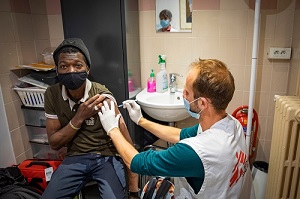 In France, in partnership with Santé Publique France, in late 2021, Epicentre conducted the first study in Europe about access to vaccination among homeless and migrant populations. The results of this study, revealed in spring 2022, showed that people living on the streets, in squats or shanty towns, in shelters or in workers' hostels were less vaccinated than the general population. Moreover, the more excluded people were, the less access they had to vaccination: 70% to 86% of people living in hotels or in shelters had received at least one dose of vaccine, but only one person out of two living on the street. This finding demonstrates the need to further develop outreach strategies including using trusted third parties to improve access to healthcare for the most vulnerable.
In France, in partnership with Santé Publique France, in late 2021, Epicentre conducted the first study in Europe about access to vaccination among homeless and migrant populations. The results of this study, revealed in spring 2022, showed that people living on the streets, in squats or shanty towns, in shelters or in workers' hostels were less vaccinated than the general population. Moreover, the more excluded people were, the less access they had to vaccination: 70% to 86% of people living in hotels or in shelters had received at least one dose of vaccine, but only one person out of two living on the street. This finding demonstrates the need to further develop outreach strategies including using trusted third parties to improve access to healthcare for the most vulnerable.
Without forgetting other diseases
Malaria
Epicentre continues its involvement in the fight against malaria in collaboration with MSF and as part of an international consortium coordinated by MORU (the Mahidol Oxford Tropical Medicine Research Unit). MORU is coordinating a project conducted at 14 sites, including the Maradi Center, in 8 African countries and 5 Asian countries to study the efficacy, safety and tolerability of artemisinin-based triple-combination therapies (TACTs) using existing antimalarial drugs (artemether-lumefantrine + amodiaquine and artesunate-mefloquine + piperaquine).
In the DRC, with MSF, we observed a significant decrease in mortality and morbidity among children under five in areas where Mass Drug Administration (MDA) was implemented, compared to areas where it was not. In Chad, Epicentre is evaluating MSF's Seasonal Malaria Chemoprevention (SMC) programs and the following the evolution of molecular markers of resistance to sulfadoxine-pyrimethamine and amodiaquine to define the best strategies for future implementation.
But Epicentre is also involved with WHO through its participation in the development of new guidelines to be published in 2022, including all prevention tools. In addition to SMC, there is now a vaccine. What place do these preventive strategies have, alone or in combination, in the years to come? There are still many challenges to overcome to control malaria, such as the implementation of new preventive, diagnostic, and therapeutic strategies, and even an effective and inexpensive vaccine.
HIV
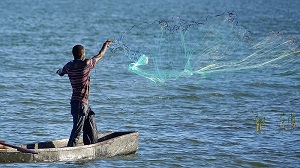 Similarly, Epicentre is involved in several projects to improve the lives of people living with HIV. For example, an Epicentre-coordinated study for MSF aims to determine the most effective and accepted mode of delivery for mobile fishing communities around Lakes George and Edward in Uganda. Better tailoring of delivery contributes to treatment compliance. As one survey participant noted, "Even when I’m busy, I’m assured of getting medicines, unlike in other approaches where you waste the entire day going to get them. Now, my peers bring my medicines to me, and if I’m away, all I have to do is call one of the members of my peer group, and they will help deliver."
Similarly, Epicentre is involved in several projects to improve the lives of people living with HIV. For example, an Epicentre-coordinated study for MSF aims to determine the most effective and accepted mode of delivery for mobile fishing communities around Lakes George and Edward in Uganda. Better tailoring of delivery contributes to treatment compliance. As one survey participant noted, "Even when I’m busy, I’m assured of getting medicines, unlike in other approaches where you waste the entire day going to get them. Now, my peers bring my medicines to me, and if I’m away, all I have to do is call one of the members of my peer group, and they will help deliver."
Two studies have highlighted the need to improve access to viral load testing and resistance genotyping. In Mozambique, the study showed that 90% of patients in treatment failure have developed resistance to at least one of the most widely used antiretroviral drugs. And double resistance to Tenofovir/Lamivudine - two molecules prescribed in combination with Dolutegravir as a new first line treatment - is present in more than half of the cases of treatment failure. A study in an MSF-managed hospital in Kinshasa, DRC and in an MSF-supported hospital in Homa Bay, Kenya, showed that in ¾ of the patients hospitalized with advanced HIV, two of the three molecules of their antiretroviral treatment were ineffective, meaning that these patients were essentially treated with monotherapy.
Strengthening our foundations
These advances would not be possible without adequate human resources and skills. Epicentre relies on a core group of epidemiologists supported by data scientists, statisticians, clinical study monitors, pharmacovigilance, and laboratory specialists.
Equipping ourselves with best technologies
The data science team develops tools to better define responses and monitoring of epidemics, implementing dashboards to monitor Ebola, measles, and malnutrition around the world, as well as all reportable diseases in Niger. Today, these data science skills are recognized and available, and Epicentre continues to consolidate its knowledge and expertise in this field. In 2021, the Lassa fever project required the strengthening of skills in this area in the five West African countries where it is deployed. We strive to ensure that these skills are aligned with operational needs. The data science team works closely with MSF to develop the most appropriate tools for monitoring epidemics such as Ebola and measles.
To stay up-to-date with developments, Epicentre collaborates in international initiatives aiming to improve the use of quantitative analysis methods. For example, a connection with the WHO Data Science Unit in Berlin is already being considered.
In addition, new technological tools have been developed: connected devices for patient monitoring, satellite images, AI, etc. During the Covid-19 pandemic, telemedicine became widespread with its advantages and disadvantages to be studied. A study by MSF and Epicentre assessed the impact of the shift to telemedicine for mental health care in 44 countries following the pandemic. This approach does not appear to be appropriate for all patients in the settings studied, including survivors of sexual or interpersonal violence, pediatrics and geriatrics, and patients with severe mental health problems.
Promoting the development of Research Centers
Research Centers in Niger and Uganda are a major component of Epicentre and play an important role in building partnerships. They are constantly developing new skills and acquiring new equipment, which is essential to meet the ongoing challenge of maintaining quality and expertise, particularly in bacteriology and tuberculosis. 2021 saw the renewal of partnerships with the University in Maradi, with the Center for Training and Research in Tropical Medicine of in Niamey, and with the Mbarara University of Science and Technology.
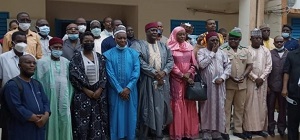 In 2021, the Maradi Center completed its molecular biology laboratory with the acquisition of a PCR machine and developed Alert-Covid-19, an electronic surveillance and alert platform. Initially deployed to deal with the pandemic, these resources are now being used for recurring recurrent diseases such as measles and meningococcal meningitis.
In 2021, the Maradi Center completed its molecular biology laboratory with the acquisition of a PCR machine and developed Alert-Covid-19, an electronic surveillance and alert platform. Initially deployed to deal with the pandemic, these resources are now being used for recurring recurrent diseases such as measles and meningococcal meningitis.
The laboratory at the Mbarara Center has been accredited GCLP (Good Clinical Laboratory Practice) by the international and independent accreditation system Qualogy. This accreditation should mark a new stage in its development and establishment in Uganda and more widely in East Africa. The center is already recognized for its research on tuberculosis. It is involved in a number of trials on this disease, including the Datura trial, which estimates the impact of an intensified initial phase of TB treatment in HIV-positive adults and adolescents, TB-speed, which aims to reduce child mortality, Intense TBM, which evaluates the effectiveness of 2 strategies to reduce mortality from TB meningitis, Contact TB, which is comparing 2 models of managing contact cases in children, Rifashort, which studies the effectiveness of reducing treatment duration, and FujiLAM, which evaluates the performance of a new diagnostic test.
These developments reinforce the place of the centers in the local and international environment and their area of expertise. In addition, the capacity of the centers has been strengthened, enabling them to carry out projects more independently. In Niger, the center is sponsoring the Niger chapter of the Organization for Women in Science in Developing Countries, which aims to create a network in which members can share their ideas and experiences and find opportunities for collaboration.
Building capacity
Transmitting and transferring skills to MSF staff and even more widely is an integral part of Epicentre's mission. Trainings provided to MSF staff and beyond is the highlight. These were severely impacted by the Covid-19 pandemic in 2021 and no "Populations in Precarious Situations" training could take place. On the other hand, the first "Diagnosis in Emergency Situations" training on epidemiology tools and the MSF Medical Academy was launched with MSF. In this professional training for future medical managers, Epicentre oversees the module dedicated to epidemiology and statistics. The objective is to provide medical managers with a strong foundation in these areas, enabling them to critically analyze health situations and promoting informed decision-making. Epicentre has also contributed to LEAP (Leadership Educational Academic Partnership), a master's program designed by humanitarians for humanitarians, delivered jointly by the University of Manchester and the Liverpool School of Tropical Medicine.
But many studies, as they are being conducted, also contribute to the improvement of skills. They often require dozens of people with specific skills, which implies substantial human reinforcement of research capacities. They support the subsequent deployment of other research projects to continue improving the health of populations.
Addressing challenges for the health of the most vulnerable
To respond to changes in our environment, the organization must evolve while maintaining its model at the crossroads of humanitarian action and international research. We must maintain the already strong links with MSF to build joint projects and thus fully meet the needs of populations.
In 2021, Epicentre has continued to open up to other strategic partners to join or develop more ambitious projects. The challenge is to strengthen them, to help increase Epicentre's attractiveness and skills. Thus, the share of external financing has increased from 32% in 2020 to 36% in 2021.
Collaborate to improve access and innovation for vulnerable populations
The project to estimate the incidence of Lassa fever continued in 2021. Funded by the Coalition for Epidemic Preparedness Innovations (CEPI), it involves many partners, including P95, a structure that collects, analyzes, and reports epidemiological data to help public health agencies, research organizations, and pharmaceutical companies improve people's access to safe and effective vaccines, the Bernhard Nocht Institute of Tropical Medicine, and the Nigerian CDC. It is expected to lead to a vaccine trial soon. Epicentre is also a partner in two projects coordinated by DNDi and funded by EDCTP to improve the management of sleeping sickness, one to evaluate fexinidazole for the treatment of the rarest form, for which enrollment has just been completed, and the other which is starting to study a single-dose oral treatment for the most common form. Other partnerships with ANRS, EDCTP, PIH, and Unitaid include TB projects at the Mbarara Center.
In 2021, Epicentre has received approval and funding from the European Union-supported EDCTP2 program to coordinate in collaboration with several partners including the London School of Hygiene and Tropical Medicine, the KEMRI-Wellcome Trust research program, and Abdou Moumouni University, a trial on the impact and feasibility of mass vaccination campaigns with a single and a fractional dose of PCV10 in Niger.
These partnerships, whether institutional or financial, promote the development of therapeutic, vaccine or diagnostic studies that respond to global health challenges. They benefit populations living in unstable conditions or with insufficient access to healthcare.
It is also a question of anticipating developments and risks. What pathologies will we be facing tomorrow? Viral diseases, of course, but we must also consider antimicrobial resistance and our use of antibiotics, as well as neglected diseases which, due to climate change, could spread well beyond the areas currently affected. There is also the question of diseases that are likely to emerge in connection with global warming. In late 2021, Epicentre committed to reducing its carbon footprint by 50% by 2030. This commitment aims to strengthen the sustainability of its training, epidemiological intervention and medical research activities for populations living in unstable conditions or with insufficient access to healthcare, who are often the most affected by the climate crisis and are already suffering its consequences.
The other looming challenge concerns chronic diseases such as diabetes and cancer, which are on the rise in Africa. We must position ourselves together with MSF to continue our field epidemiology and research activities in support of MSF. Providing information and solutions to improve access to quality health care is based on our intangible bond with MSF and guarantees our autonomy.
Photo credit:Nicolas Guyonne/MSF, Harrison Fortune/MSF, DR








